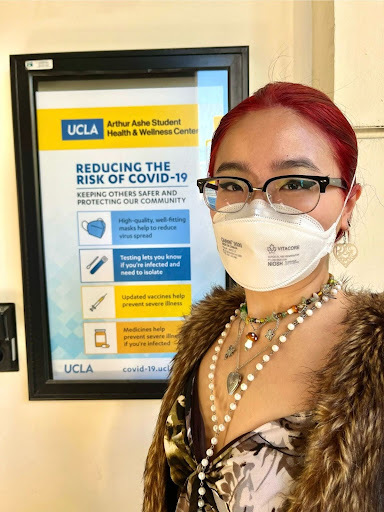Photo by Ember Ireland/OutWrite
How many people do you notice in your lectures wearing masks? How many coughs do you hear? Even though federal and state government policies treat COVID-19 risk with little concern, health science research continues to demonstrate the necessity of masking to prevent its contraction. COVID is a multi-systemic, vascular disease that damages every system in your body. Each COVID-19 infection that you contract results in cumulative damage, weakening the immune system. Weakened immune systems aren’t able to fight off infection as readily, meaning that any sickness can potentially be life-threatening and disabling. Unchecked immune system damage forces constant sickness to be many people’s new reality.
Despite being a research institution, UCLA has stopped requiring masking and has significantly reduced communication on infectious disease, contributing to the decreased awareness around the prevalence of COVID. All of this is something fourth-year Psychobiology student Gwendolyn Hill (she/her) — also an OutWrite copy editor and writer — is working to change as a coordinator for the UCLA Disabled Student Union (DSU).
Before fall quarter 2023, Hill wrote “A Resolution to Ensure UCLA’s Health, Safety, and Wellness in Response to COVID-19,” explaining that the UCLA community needs administration to consistently promote COVID safety. The resolution called for UCLA to provide and maintain extensive, diverse, free, and accessible personal protection equipment, adequate air filtration, free PCR testing, sick pay for student workers, academic access, and more. Following the unanimous passage of the resolution by the Undergraduate Student Association Council (USAC), Hill formed a group including Arthur Ashe Student Health and Wellness Center’s Executive Director Chaitali Mukherjee M.D., M.P.H. (she/her), Director of Clinical Operations Amrit Nagra, M.P.H. (she/her), and Outreach and Programs Manager Geno Mehalik, M.P.A. (he/they), the USAC Student Wellness Commissioner Jennis Kang (she/her), and Ashe’s Health Education and Resource Team (HEART) members and Program Manager Finn Kovi (they/them) in order to implement her Health Promotional Initiative. The Initiative provides free, high quality, accessible respirators such as N95, KN95, and KF94s at over 25 locations at UCLA in addition to stocking surgical masks in five specific dispensers, updates UCLA’s website to reflect protocol changes, and creates updated signage about COVID around campus.
There are four new updated signs, created by the Administration Marketing and Communications Team with Hill’s input and pictured below, that focus on four different key aspects of COVID-19 and public health: layered mitigations, airborne transmission, higher risk situations, the importance of wearing a mask to protect the community, and Long COVID. The signs can be found on every building at UCLA and accessed online on the UCLA COVID-19 website. The Ashe Center has also posted an explanation for each sign for students to refer to on their website.
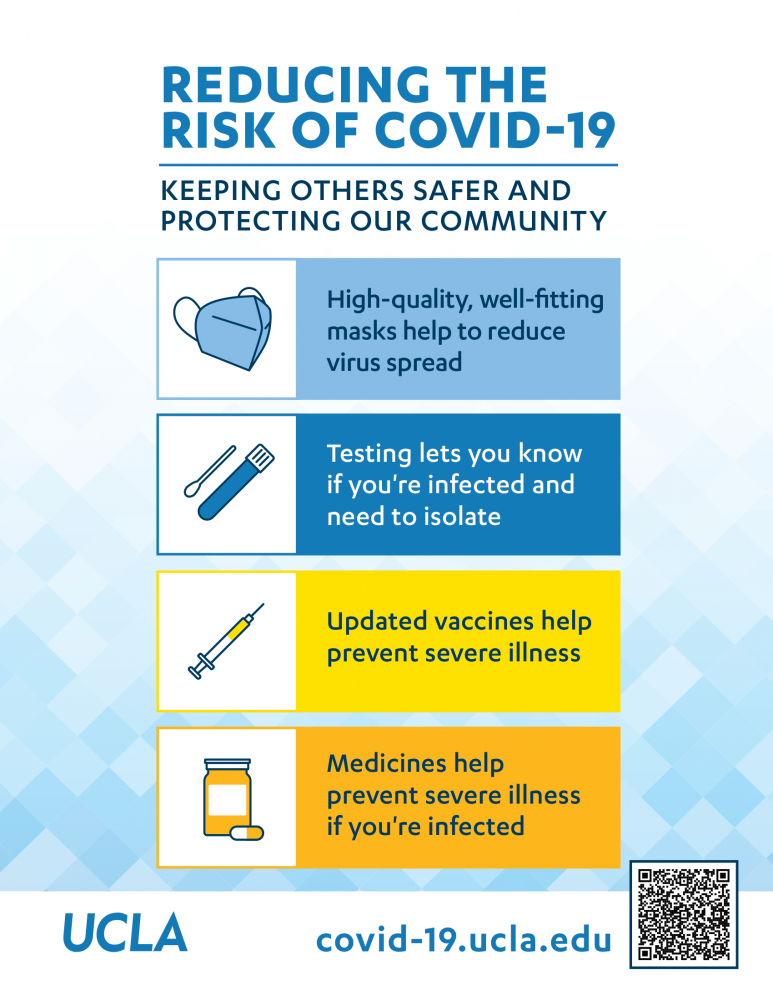
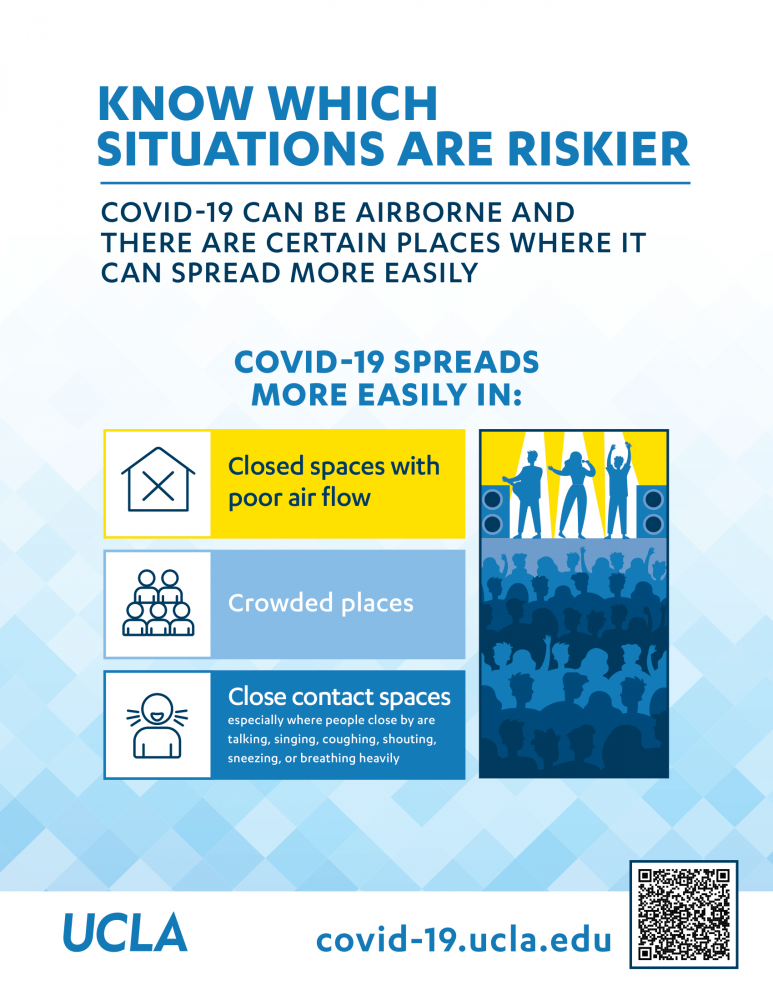
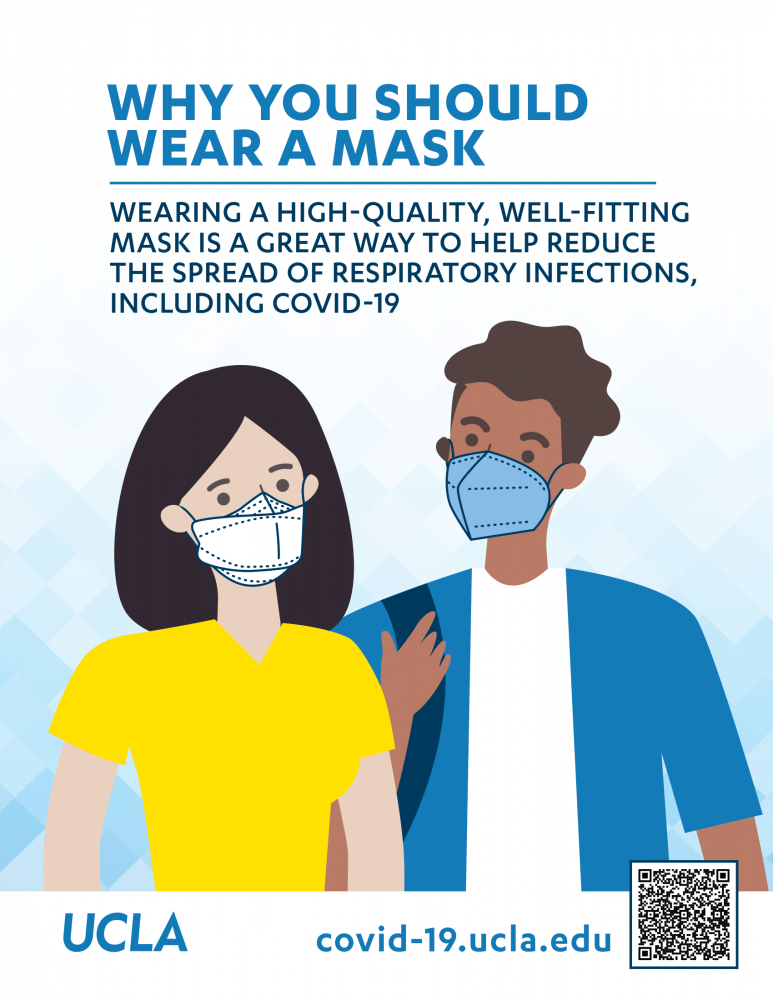
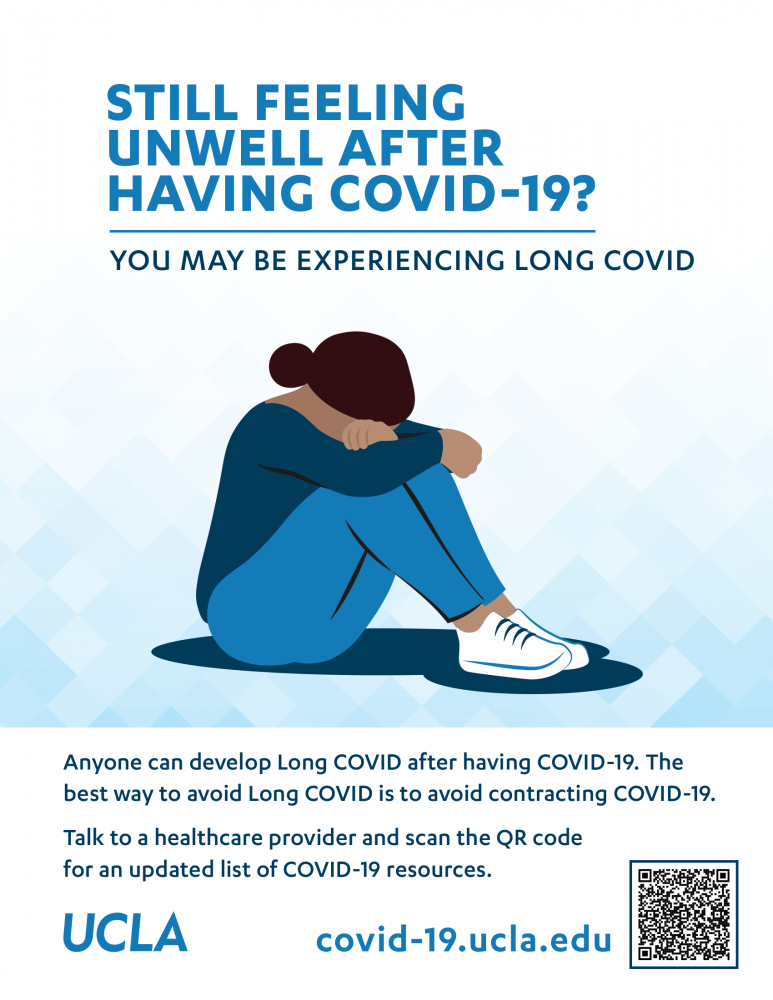
“The project acknowledges the diverse needs of student bodies, including people with disabilities,” said Shannon Stubblefield (they/she), HEART program coordinator and Health Promotional Initiative team member. “[The project] underscores the significance of disability justice and principles of harm reduction.” Disability justice, they quote, means the empowerment of disabled people as well as the prioritization and centering of disabled people’s needs.
Stubblefield, also a second-year Public Health graduate student, has noticed that they are the only person still masked in their cohort full of future public health leaders. “How can this be if we’re apparently believing in evidence-based solutions — if we apparently care for vulnerable communities?” Stubblefield asked. “To me, it felt like the school has a lot of care in theory but not in the classes, and that was pretty evident in the droppings of the COVID-19 mitigation.”
UCLA has the responsibility of serving its students, so “it is necessary for students to have access to resources. You all come to school here. You pay your fees and your tuition,” said Minnie Esquivel Gopar (they/she/elle/ella), the LGBTQ+ Campus Resource Center (CRC) Administrative Coordinator. “[Students] want things to maintain the holistic health and wellbeing of our communities. It’s necessary for institutions to react and serve the communities that are vital to their existence.”
This is where the Health Promotional Initiative comes in — to fill the gap between what is currently provided and what is needed by the UCLA community. People continue to spread COVID, resulting in Long COVID, disablement, hospitalization, and over 1000 deaths per week. With respiratory syncytial virus (RSV) spreading and tuberculosis and measles making comebacks, it is vital to continue taking precautions against contracting these airborne pathogens and spreading them. Hill knows the risks and the implications of Long COVID firsthand.
“As somebody who has been disabled by COVID-19,” Hill said, “accessibility is my absolute top priority.” She experiences “chest pain, insomnia, shortness of breath, post exertional malaise (PEM), vertigo, gastrointestinal issues, problems with appetite, tinnitus, problems with concentration and processing information, and problems with [her] short and long term memory.” She also knows people with even more symptoms are being left behind and emphasized that her symptoms are on the more “mild” end of the spectrum.
Long COVID is a chronic, disabling disease that can affect anyone and impact multiple organ systems. As described by Dr. Ziyad Al-Aly in the U.S. Senate Committee on Health, Education, Labor and Pensions (HELP), Long COVID is only truly avoidable by not contracting COVID in the first place. In addition to ventilating and purifying the air as Dr. Al-Aly has stressed, Ashe Executive Director Mukherjee said that “wearing a mask is the easiest and most accessible way to prevent the spread of COVID,” especially since the risk of Long COVID is increased with each acute infection of COVID.
Although anyone can develop Long COVID, marginalized communities are at disproportionately heightened risk of infection and subsequent Long COVID, hospitalization, and death. This is due to systemic neglect of disabled people, income inequality, and racist and ableist practices in healthcare, among other intertwined factors. At least 75% of adults in the U.S. are considered high-risk for severe outcomes from COVID-19 by CDC criteria.
“Accessing quality healthcare is a privilege that is impacted by institutional racism, class, and immigration status,” Mukherjee said. “Masking is a harm reduction approach to public health to decrease the possibility of negative outcomes that certain communities experience at greater rates.”
However, UCLA has neglected to require masking or implement adequate protections in order to prevent the disablement of its student body and wider UCLA community, as addressed in Hill’s DSU Resolution and the DSU and the Mother Org’s Strike for Our Safety in 2022. After its initial COVID lockdown, UCLA ceased to provide support for on-campus workers with COVID, has not maintained American Society of Heating, Refrigerating and Air-Conditioning Engineers (ASHRAE) guidelines around air filtration, and has failed to spread accurate information about COVID severity and safety measures. Hill reported that higher administration has refused the DSU’s requests to share a campus-wide announcement through BruinPost on infectious disease updates and reminders. They also refused to announce information on the new accessibility of masks and resources that UCLA is paying for. In fact, UCLA has prohibited clubs and organizations on campus from requiring masks, according to Ray Hsiao (they/any), a fourth-year Computer Science student.
While trying to recover from COVID at the end of the fall quarter of 2023, Hsiao was forced to choose between taking a final or taking an incomplete for a class. UCLA requires a minimum isolation period of five days — although longer than CDC minimums, this is shorter than what scientific research shows for the typical contagious period of COVID-19. Despite living in on-campus housing, Hsiao was not provided with UCLA’s limited isolation housing, which meant they were forced to put their suitemates at risk of contracting COVID. Additionally, people in isolation housing no longer get food delivered to them. Because UCLA removed the resources allowing dining hall takeout or delivery, Hsiao could not get food without “posing a danger to other people.” It was even more difficult for Hsiao to access care without UCSHIP.
Their situation is by no means unique but is indicative of the failure of UCLA’s COVID policies. Hsiao believes “it is important to protect everyone we can,” and this is not possible when the needs of disabled, high-risk, and immunocompromised people (and the general population) are ignored.
“All of the incredible work that Gwen has done to carry this initiative forward from its inception to its implementation is so vitally, vitally needed by our community,” Esquivel Gopar, Hill’s supervisor at the LGBTQ+ CRC, said. “Society is moving on from prioritizing the safety and the well-being and the public health of our communities — specifically, communities that are multiply disenfranchised and impacted by larger public health issues, whether it be COVID, whether it be RSV, whether it be, you know, the HIV/AIDS pandemic.”
The queer and trans community knows what it is like to be left behind, disabled, and ostracized by society, especially because of healthcare policy failures. Paralleling the HIV/AIDS pandemic, COVID and HIV both damage T cells and the immune system as a whole. The LGBTQ+ CRC consistently stocks high-quality masks and safe sex supplies and is one of the distribution sites for the Health Promotional Initiative. As Stubblefield stated, it is important to prevent death rather than be motivated after already having lost more lives.
Despite our federal, state, and local governments’ silence on COVID, the pandemic is ongoing. Students continue to be immunocompromised and turn to university support because they are neglected elsewhere. “Ignoring it doesn’t make it disappear,” Hill said. The Initiative needs community engagement and support to prevent its termination at the end of June.
“Her leadership is a catalyst for positive change,” Stubblefield said. By fighting for the prioritization of public health on campus, Hill has turned her frustration into action.
“It’s a lot more about profit [to the university and state] and whether or not you can push out productivity than whether or not you just deserve to live,” said Hill. “We, the people, are not disposable. You and your communities are not disposable.”
Credits:
Author: Ember Ireland (They/Xe)
Artist: Ember Ireland (They/Xe)
Copy Editors: Dalia Villalobos Jimenez (She/Her), Bella (She/Her)

